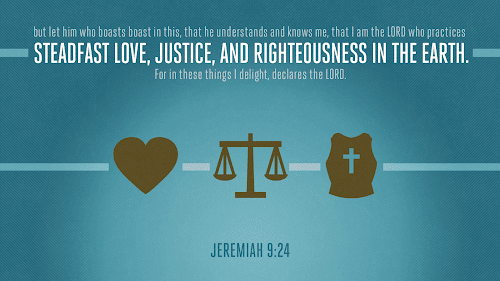Boast in the Lord
 |
| © Faithlife Corporation |
The people of Judah thought that their exterior religiosity insured them against punishment for their inward vileness. Can’t we be guilty of the same?
Through the prophet Jeremiah, God laid forth his future punishment of Judah’s sins very clearly as a warning for the people to turn away from their sins. Chiefly, they had abandoned God and had turned to worshipping the false gods of Ba’al, as if they had chosen water from a dirty and leaky cistern over pure, fresh and clean water from a spring (Jeremiah 2). In addition, the Jews had been treating each other harshly with no concern for the needy, instead trusting in political alliances and their own inflated sense of righteousness to advance “goodness” in their country.
God Will Punish Everyone
In view of his pending judgement of Judah, God declared through the prophet Jeremiah,
“Let not the wise man boast in his wisdom, let not the mighty man boast in his might, let not rich man boast in his riches, but let him who boasts boast in this, that he understands and knows me, that I am the LORD [Yahweh] who practices steadfast love, justice, and righteousness in the earth. For in these things I delight, declares the LORD [Yahweh]” Jeremiah 9:23-24
In order to realize the full gravity of this statement, you must read the entirety of the preceding passage (Jer 7-9) (and preferably from the beginning of Jeremiah). God’s punishment of Judah will be so severe and frightening that:
- Eyes will need to be fountains to cry all the tears that are necessary (Jer 9:1)
- One would have to stay in a lodge in the desert away from civilization to get away (Jer 9:2)
- Mothers should teach their daughters how to lament so there are enough mourners (Jer 9:20)
- The Valley of Ben Hinnom (where the Jews sacrificed their children) will be called the Valley of Slaughter (later this becomes what we know as “Hell”) (Jer 7:30-34)
3 types of people are warned not to brag about their status: the wise, the powerful and the rich. The qualities these people possess are not an illusion, they do bring actual benefits to them during life. However, these qualities can mislead one to think they are immune from punishment.
The “wise” in this case are those who think they are wise, but don’t have true wisdom (see Jer 8:8-9). They may have very clever insights, cunning self-help ideas and have solutions for all of life’s problems.
The word “mighty” or “powerful” may not resonate with us today as well as it did then. Oftentimes, the word “mighty” in Hebrew would be referring to a powerful military or skill in combat. In today’s world, this could be correlated to anyone with power or influence that may protect them from opponents.
Who the "rich" person is is very clear. With their contacts they can promote their agenda. Perhaps, they have great economic influence, exercising monetary control over people's lives. Whatever the case, they have enough money to protect them from poverty and financial hardship.
Each one of these people will be judged by God.
What God Expects of People
These three qualities are things the world values, but none of them should be bragged about, nor can they protect anyone from God’s punishment. Instead,
“Let him who boasts boast in this, that he understands and knows me, that I am the LORD [Yahweh] who practices steadfast love, justice, and righteousness in the earth. For in these things I delight, declares the LORD [Yahweh]”- Jer 9:24
The person who can boast, boasts in the fact that they know God- only a relationship with God will spare a person from God’s judgement, personal attributes are worthless (2 Cor 10:17-18).
A person who understands God is someone who discerns the way God behaves. While the word “know” here simply means to “be intellectually aware”, it is paired with the understanding (importing the meaning of wisdom). The person who can rightfully boast does not only understand and know Yahweh, but imitates his character. He is the God who practices,
“Steadfast love, justice and righteousness in the earth. For in these things I delight…” Jer 9:24b
Steadfast love comes from the Hebrew word, hesed (חֶ֛סֶד), which can also be translated “lovingkindness”. This type of love is one that expresses utmost fidelity through long-term affection, devotion and care.
The word for justice refers to the action of making proper legal verdicts, essentially seeking the goodwill of people, often through societal or personal change.
Righteousness refers to right behavior and moral conduct.
Notice the text does not say the ones who can be proud are the ones who practice these qualities, rather those who understand God AND practice these qualities. By quoting this exact verse Paul expounds the idea that these qualities can only be practiced by knowing God,
“wisdom from God, righteousness and sanctification and redemption, so that, as it is written, “Let the one who boasts, boast in the Lord.” “1 Cor 1:30b-31
After declaring his own qualities, God states that he delights in these qualities. The implication is that God will delight in those who practice long-term love, seeking goodwill and upright behavior.
While wisdom, power and wealth may provide benefits- they will not avert God’s future reckoning of everything we have ever done.
Do you think your behavior will make you right before God? Do you want to be proud of something? Then practice loving kindness, justice and righteousness through discerning the character of God. If you do not understand God, these qualities cannot be practiced and the judgement will not be averted.


Comments